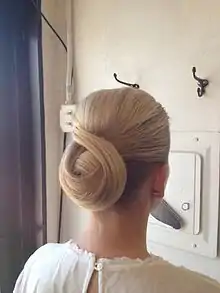
A chignon (UK: /ˈʃiːnjɒ̃/, US: /ˈʃiːnjɒn/, French: [ʃiɲɔ̃]), from the French chignon meaning a bun, is a hairstyle characterized by wrapped hair on the back of the head. In the United States and United Kingdom, it is often used as an abbreviation of the French phrase chignon du cou, signifying a low bun worn at the nape of the neck.[1][2][3]
Chignons are generally achieved by pinning the hair into a knot at the nape of the neck or at the back of the head, but there are many variations of the style.[4] They are usually secured with accessories such as barrettes or hairpins.[5] Chignons are frequently worn for special occasions, like weddings and formal dances, but the basic chignon is also worn for everyday casual wear.
History
The chignon can be traced back to ancient Greece, where Athenian women commonly wore the style with gold or ivory handcrafted hairpins. Athenian men wore the style as well, but they fastened their chignons with a clasp of "golden grasshoppers", according to The History of the Peloponnesian War, by Thucydides. The chignon was specific to Athens, as other city states, such as Cyprus and Sparta, had their own styles of hairdressing. The chignon was also popular in ancient China, where married women wore the low, knotted hairstyle.
Male writers of the Victorian era, like Anthony Trollope, were fond of poking fun[6] at the perceived absurdity of the fashion, which was much in vogue in England in the 1860s. In the 1890s, the dancer Cléo de Mérode popularized the hairstyle in France.[7][8][9]
See also
References
- ↑ Lacey, Miriam (21 December 2011). "What's the Difference Between a Bun and a Chignon? Plenty, Actually". Bellasugar. Archived from the original on 9 January 2012. Also available at Allure.
- ↑ Rud, Melanie (10 April 2022). "The Chignon Is Making a Major Comeback, Here's How to Wear It". Real Simple.
- ↑ Ngo, Hope (3 February 2023). "The Difference Between A Bun And A Chignon Explained". The List.
- ↑ "Perched Hats on Buns: Diminutive caps cling to long, coiled-up hair". Life. 27 September 1954. p. 87.
- ↑ Minden, E.G. (2007). "Getting Started". The Ballet Companion: A Dancer's Guide to the Technique, Traditions, and Joys of Ballet. p. 28. ISBN 9781416595717.
- ↑ Trollope, Anthony (1869). He Knew He Was Right. Archived from the original on 29 November 2014. Retrieved 13 April 2018. Chapter 8.
- ↑ "The Pennsylvania Gazette ...: Weekly Magazine of the University of Pennsylvania". 1916.
- ↑ "The American Telephone Journal". 1903.
- ↑ Maugham, William Somerset (1915). Of Human Bondage. ISBN 9780758317155.
Bibliography
- "Bustle-era hairstyles". demodecouture.com.
- Cox, Caroline; Leguen, Jean Marie (8 September 2003). "Chignon". Woman's Hour. BBC Radio 4. Retrieved 29 April 2007.
- DeBrohun, Jeri. "Power Dressing in Ancient Greece and Rome". Commonwealth History Project. National Center for History Education. Archived from the original on 2007-02-11. Retrieved 29 April 2007.
- "History of Hair". 2004. UKHairdressers. Accessed 29 April 2007.
- Martin, Kiley. "Early Hairstyling of the Hellenistic Period in Ancient Greece". Morbid Outlook. Archived from the original on 6 February 2012. Retrieved 29 April 2007.
- Mayer, Tanna; et al. (28 March 2007). "How to Style a Classic Chignon". Wikihow. Retrieved 29 April 2007.
External links
 The dictionary definition of chignon (hairstyle) at Wiktionary
The dictionary definition of chignon (hairstyle) at Wiktionary